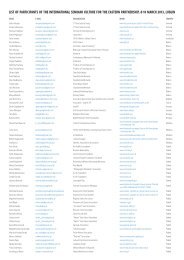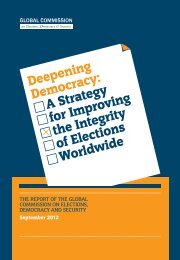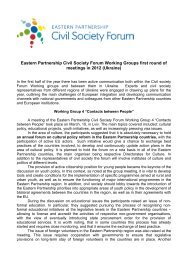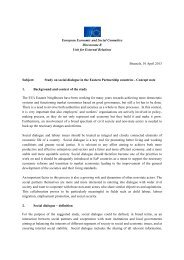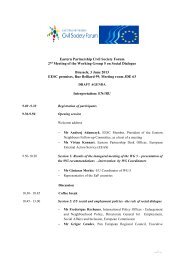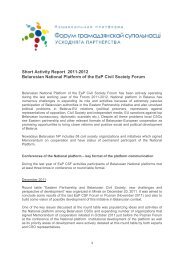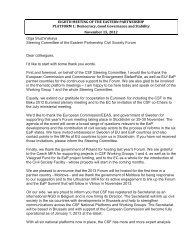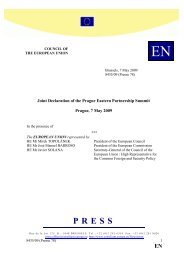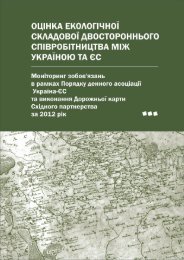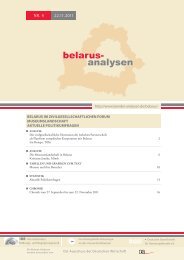Non-formal education - Eastern Partnership Civil Society Forum
Non-formal education - Eastern Partnership Civil Society Forum
Non-formal education - Eastern Partnership Civil Society Forum
You also want an ePaper? Increase the reach of your titles
YUMPU automatically turns print PDFs into web optimized ePapers that Google loves.
egain self-esteem, strengthen capacities and seek for new opportunities. Moreover, opening of the<br />
CECs changed the style of life and thinking for many memebrs of the communities: the centres become<br />
the only places in the settlements for public gathering, meetings where everyone used to treat one<br />
another with respect and dignity, express own opinions without any fear and shyness and accept<br />
other`s ideas. Joint participation in the activities for IDPs and locals, representative of different national<br />
minorities (e.g. Armenias and Azeris) as well as community meetings and exchange of information<br />
highly contributed to the formation of integrated, healthy and advanced civil society.<br />
These non-<strong>formal</strong> <strong>education</strong> institutions serve as an important anchor to the civic, <strong>education</strong>al,<br />
business, artistic and other energy growing in the communities. They address the needs of area<br />
residents by providing <strong>education</strong>al opportunities, leading to development of basic competencies,<br />
important skills and career advancement, in a supportive environment that encourages a lifelong quest<br />
for knowledge. Educational projects for beneficiaries aim at developing of skills which help them to<br />
overcome social disadvantage, prepare them for the world of work and help them to cope with rather<br />
severe life experience and difficult reality.<br />
In addition, goal of such institutions is to offer an adequate and safe, free and open space to<br />
population for all community based initiatives, meetings, information sharing, various <strong>education</strong>al<br />
activities and training programmes, youth initiatives and consultations.<br />
In order to ensure continued operation of the Centres and sustainability of the initiated activities<br />
the local community based organizations were formed on the bases of Community Education Centres<br />
undertaking ownership of the premises at the end of the project. The newly established organizations<br />
maintained close liaison with the local municipalities as well as with other stakeholders to support<br />
further implementation of the programs. All the six centres are successfully functioning contributing to<br />
poverty reduction, social cohesion and sustainable development of their respected regions. Currently<br />
the Centres have several sources of funding: self-financing, funding from local self-government and<br />
support from international organisations.<br />
Beneficiaries. In 2005 the Institute for International Cooperation of German Association of<br />
Universities – dvv international conducted the survey in order to determine the engagement of the<br />
adult population in the lifelong learning process. 25-62 aged adults were questioned during the survey.<br />
74% stated that they have not deepened their professional knowledge in the recent years, 6% of the<br />
population noted that they have taken short courses of vocational training and for raising qualification,<br />
as well as participated in lecture-seminars and training programs, 21% were reading special handbooks<br />
for vocational <strong>education</strong>, 10% tried to enhance their skills through self-teaching, and 1% was engaged<br />
in programs for acquiring academic degree. As stated above, no up-to-date statistical information<br />
is available nowadays, but it is obvious that number of people engaged in non-<strong>formal</strong> <strong>education</strong> is<br />
increasing substantially.<br />
The chart below shows the most targeted beneficiaries in non-<strong>formal</strong> <strong>education</strong> 37<br />
Youth/children<br />
23%<br />
Internally displaced<br />
oersons (IDPs)<br />
18%<br />
Other (teachers,<br />
active members of community,<br />
civil servants, etc.<br />
6%<br />
Women<br />
15%<br />
Socially<br />
unprotected<br />
(unemployed)<br />
20%<br />
National<br />
minorities<br />
18%<br />
37<br />
Based on estimations available in the study “<strong>Non</strong>-governmental organisations in Georgia.Development Dynamic and<br />
Tendencies” by. Centre for Strategic Research and Development of Georgia, 2010<br />
62



